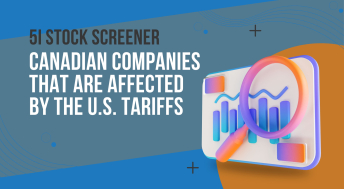As we approach the end of the year, many investors begin to take advantage of a common practice in investing; tax-loss selling. This is a chance for investors to 'benefit' from stocks that resulted in a capital loss. This is done by selling a losing position in a non-registered account and in turn reducing the overall capital gains tax one owes on their investments. In addition to this, unused capital losses can be used from up to three years in the past or carried forward indefinitely.
Small-cap stocks, in particular, are usually the most affected by tax-loss selling due to a combination of two factors:
1) They have a larger retail ownership base who invest using their non-registered accounts.
2) Smaller companies tend to be less liquid and can be more impacted by broad-based selling.
Large-cap stocks are not as affected by tax-loss selling since they are generally seen as ‘more stable’ than small-caps, resulting in relatively less sensitivity to price movements.
We find this to be a relevant point to mention given the nature of the broad-based sell-offs we have seen this year. The macro environment of elevated inflation, and rising interest rates, has led to a risk-off environment, causing some of the more volatile names to face sharp corrections. Although, there are likely still legitimate growth prospects for some of these companies. As we approach the end of the year, it may be worth considering realizing a loss to cut one’s tax bill and start fresh with a few high-conviction names at a low price.
Following the sale of these ‘losing’ stocks, many long-term investors may choose to re-invest in those same stocks (after 30 days) if they continue to show good fundamentals and have strong prospects for the future. After all, even the best of companies can have a bad year. Writing off good companies based on one year of bad performance has proven to be a source of regret for many investors.
The Stock Screen
This month’s stock screener identifies companies whose share price has depreciated in price throughout the year by at least 15% while expecting revenue growth of at least 15% next year. These are companies that might be more sensitive to tax-loss selling as year-end approaches but due to the growth and fundamentals, might show an opportunity if they do see weakness due to tax-loss selling.
Stocks on this list not in one’s portfolio can also serve as a general watchlist over the next 30-60 days for names that may continue to be (unduly) sold off due to other investors engaging in tax-loss selling. While we think some names on this list have the potential for recovery, keep in mind this is not an endorsement for the names listed below.
For reference, we have also linked tax-loss selling screener articles from the last two years here (2021) and here (2020).
| Ticker | Company Name | GICS Sector Name | Company Market Cap (CAD) |
YTD Price % Change | Estimated 1 YR Revenue Growth | Fwd P/E (NTM) |
| POW.TO | Power Corporation of Canada | Financials | $20,378,157,369 | -20.0% | 61.0% | 8.6 |
| AQN.TO | Algonquin Power & Utilities Corp | Utilities | $8,313,179,918 | -32.5% | 18.0% | 12.5 |
| NVEI.TO | Nuvei Corp | Information Technology | $6,357,141,843 | -45.1% | 18.5% | 15.5 |
| GTII.CD | Green Thumb Industries Inc | Health Care | $3,738,170,783 | -35.7% | 15.3% | 31.5 |
| VRNO.CD | Verano Holdings Corp | Health Care | $2,467,963,022 | -54.0% | 21.1% | 20.9 |
| GSY.TO | goeasy Ltd | Financials | $2,071,306,070 | -27.3% | 19.3% | 8.9 |
| DRM.TO | DREAM Unlimited Corp | Real Estate | $1,230,910,380 | -22.7% | 32.8% | 17.4 |
| NBLY.TO | Neighbourly Pharmacy Inc | Consumer Staples | $1,042,373,248 | -40.8% | 25.7% | 28.8 |
| CTS.TO | Converge Technology Solutions Corp | Information Technology | $982,179,157 | -57.0% | 25.4% | 7.0 |
| MDA.TO | MDA Ltd | Industrials | $818,619,153 | -27.8% | 35.7% | 27.7 |
| CF.TO | Canaccord Genuity Group Inc | Financials | $783,749,387 | -47.3% | 21.1% | 5.0 |
| VGCX.TO | Victoria Gold Corp | Materials | $524,088,587 | -42.7% | 38.4% | 9.0 |
| LCFS.TO | Tidewater Renewables Ltd | Energy | $399,338,572 | -21.5% | 314.6% | 5.7 |
| PRL.TO | Propel Holdings Inc | Financials | $300,609,494 | -35.4% | 45.2% | 4.8 |
| MPCT_u.TO | Dream Impact Trust | Real Estate | $296,903,875 | -27.6% | 61.6% | 9.3 |
| XTC.TO | Exco Technologies Ltd | Consumer Discretionary | $279,210,632 | -30.1% | 24.8% | 8.6 |
| CHW.TO | Chesswood Group Ltd | Financials | $200,160,154 | -21.3% | 28.5% | 6.1 |
| MND.TO | Mandalay Resources Corp | Materials | $165,174,385 | -22.1% | 16.5% | 3.2 |
| VHI.TO | Vitalhub Corp | Health Care | $105,387,740 | -26.1% | 20.4% | 20.8 |
| EAGR.TO | East Side Games Group Inc | Communication Services | $102,242,157 | -64.6% | 21.6% | 42.0 |
Notable companies
Neighbourly Pharmaceutical (NBLY): Neighbourly is a healthcare company, with a strong cash flow profile. We like its prospects as an acquirer of small pharmacies. It has a unique niche and a strong market position. It is also growing at a good rate due to its acquisitions and it is also free cash positive. We feel that while its small size adds risk, we are comfortable with this name and feel that it has good growth potential into 2023 and beyond.
Nuvei Corp (NVEI): This name is held in our Model Growth Portfolio, and operates in the payment technology solutions space. It is a mid-cap name ($6.0 billion market cap) with strong sales growth and free cash flow generation. Its valuation has come back down to earth, and we think it now represents good value for a growing tech name.
Goeasy Ltd (GSY): Goeasy has an aggressive growth plan, has been beating earnings and sales estimates, and its ROE has been growing nicely. With operations in the sub-prime lending space, we understand investors’ initial concerns due to the current rising interest rate environment, but we feel this name has proved its excellent operational execution and profitable growth strategy.
Converge Technology Solutions (CTS): The small-cap tech space, in which Converge operates, has seen a large decline in price over the past year. Investors fled the small-cap and technology space, and so this name was hit particularly hard. It has demonstrated good growth, however, is trading at near-historic valuation lows, and has exhibited good expansion in its balance sheet. It has beaten several of its earnings estimates recently, and we think that cheap, profitable tech names like CTS can present good opportunities for the future.
A final point we would emphasize here is that the benefits derived from tax-loss selling are of secondary importance when compared to the long-term benefits of investing in a company with sound fundamentals. Therefore, we think tax-loss selling should not form the basis of major investment or portfolio decisions. Often, investors can spend too much time figuring out how to save on taxes only to get back a small amount in the grand scheme of things. We think time is better spent more on understanding companies as good companies end up being much more rewarding in the long-run.
Research for Today, Invest for Tomorrow.

Twitter: @5iChris
Disclosure: The author does not hold positions in any stocks or funds mentioned.


![Headline image for 5i Stock Screener: Canadian Stocks for Tax-loss Selling [2022]](https://www.5iresearch.ca/img/4662_681_374_preview.jpg)



Comments
Login to post a comment.